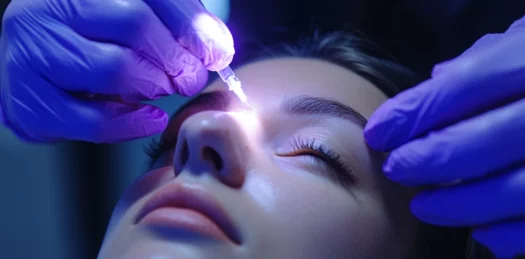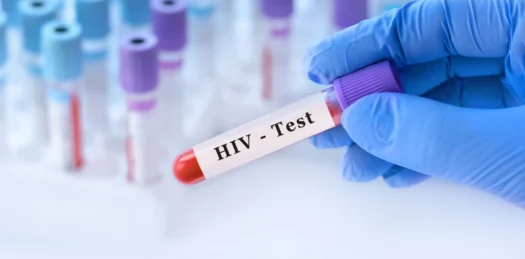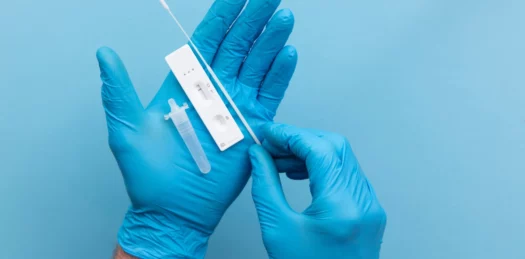As a company, we support manufacturers of medical devices within the full scope related to clinical trials on medical devices. The experience and knowledge our experts bring to the table help us provide services at a much higher level than our competition.
You can rely on our assistance, starting from the trial planning stage and trial feasibility analysis, through drafting documentation, obtaining trial approval, identifying and matching the appropriate site, and finally drafting a full report. We adjust our activities to the individual needs of every customer.
What is a medical device?
A medical device is a product used in humans for at least one medical application, such as diagnosing, monitoring, treating diseases, injuries or disabilities. Medical devices may also be used for investigating, replacing or modifying anatomical structures, a physiological or pathological process or state. Medical devices, as per their definition, also include:
— devices for the control or support of conception;
— products intended for cleaning, disinfection or sterilization of medical devices. Therefore, an instrument, apparatus, device, software, implant, reagent, material or any other item meeting the above conditions may be considered a medical device.
What is a medical device clinical trial?
A medical device clinical trial is any systematic investigation involving one or more human subjects, undertaken to assess the safety or performance of a medical device. The purpose of a clinical trial is to derive reliable and statistically significant clinical data that will enable the device manufacturer to determine if the device is effective and safe in clinical applications. The trial is to provide information on whether or not the device may be used in humans and released onto the market.
01
Trial feasibility assessment
Feasibility assessment is one of the first steps when planning a clinical trial. The process includes an assessment of the potential for performing a clinical trial in a given country or at a particular trial site. Trial feasibility assessment is multiplanar and must include the following:
- Selection of a country where the trial is to be conducted, considering the infrastructure and equipment of trial sites, as well as epidemiology in a given place and available expert base.
- Analysis of local legal requirements and ethical conditions.
Q&A
Why conduct a trial feasibility assessment?
Verifying trial feasibility allows for a realistic assessment of whether it is justified to conduct a clinical trial under the given circumstances and in the particular target group. This allows to select the trial site that is best suited to your needs, which in turn has a significant impact on the duration and cost of the clinical trial.
Which factors impact trial feasibility assessment?
- Epidemiological situation
- Availability of the relevant patient population
- Specifics of the trial site, i.e. research procedures, infrastructure
- Legal and ethical considerations at the trial location
02
Support in selecting the trial site
We cooperate with many trial sites and laboratories in the European Union and abroad. Our partners provide us with access to a large and diversified (in terms of diseases and therapeutical needs) patient base. This is extremely important for the trial to generate authentic data about the device in comparison with the needs of a patient/physician.
When selecting the trial site, we consider the following factors:
-Demand for availability of the trial target group, considering the population size and therapeutic indication, as well as recruitment capacity of the site.
- Quality assessment of the services provided by the trial site: reporting timeliness, accuracy in drafting and collecting trial records, trial staff communication skills, compliance with laws and procedures, availability of qualified personnel and medical equipment meeting the legal requirements and requirements of the trial itself.
-Infrastructure, technology and expert resources of the site.
Q&A
Who can be an investigator in a clinical trial?
The investigator shall be a person exercising a profession which is recognized in the Member State concerned as qualifying for this role on account of having the knowledge and experience in patient care. Please note that requirements depend on a given type of medical device. In the case of trials conducted in minors, the investigator or their designee must also have experience in working with minors.
Other personnel involved in conducting a trial shall be suitably qualified, by education, training or experience, in the relevant medical field and in clinical research methodology, to perform their tasks.
What are the investigator’s obligations?
Their obligations include:
- preparation for conducting a clinical trial, which includes reviewing the documentation of the trial and medical device;
- communication with trial subjects regarding the trial purpose, course, rights, risks and benefits;
- reporting to the sponsor any serious adverse event, except for those that the protocol or investigator’s brochure identify as not requiring immediate reporting;
- monitoring clinical trial conduct compliance with local laws;
- providing medical care to trial subjects.
Are all trials conducted at one location?
It depends on the therapeutic indications, target population and recruitment capacities at a given location. This is why sometimes several research facilities are involved in a trial.
03
Clinical trial design and registration
Clinical trial monitoring is one of the key elements to ensure conducting a high-quality trial, as well as reliability and transparency of the clinical data obtained during the trial.
A clinical trial should be conducted based on the previously drafted trial protocol, and any data obtained must be thoroughly documented. Moreover, trial data must be analysed and reported according to the trial design. What is particularly important is for the ethical aspects of the trial to be in line with the applicable legal provisions. Trial monitoring covers the scope of planned, systematic activities that are to ensure transparency in conducting clinical trials, data reliability and protection of the subjects’ rights.
Proper clinical trial monitoring guarantees completing the trial as scheduled. Selecting properly qualified staff with experience in trial monitoring can drive considerable cost savings. Usually, the costs of conducting and monitoring the trial constitute 1/3 of the total trial costs.
Composed of experts from various therapeutical fields, the Pure Clinical team will provide monitoring support. We have the skills and tools necessary to cooperate with trial sites in a seamless and effective manner.
Q&A
What is clinical trial monitoring?
Clinical trial monitoring mainly consists in supervising its progress and ensuring that trials are conducted, documented and reported according to the trial protocol, applicable legal requirements and good clinical practice.
What is GCP?
GCP stands for Good Clinical Practice. It is an international set of rules determining the principles for designing, performing and recording results of clinical research on human subjects. Good Clinical Practice was compiled by the International Conference on Harmonization of Good Clinical Practice (ICH-GCP).
Who monitors a medical device trial?
A trial monitor should be a qualified person with appropriate knowledge about the clinical trial, trial protocol and all the necessary quality-related documents and procedures.
04
Trial monitoring
Clinical trial monitoring is one of the key elements to ensure conducting a high-quality trial, as well as reliability and transparency of the clinical data obtained during the trial.
A clinical trial should be conducted based on the previously drafted trial protocol, and any data obtained must be thoroughly documented. Moreover, trial data must be analysed and reported according to the trial design. What is particularly important is for the ethical aspects of the trial to be in line with the applicable legal provisions. Trial monitoring covers the scope of planned, systematic activities that are to ensure transparency in conducting clinical trials, data reliability and protection of the subjects’ rights.
Proper clinical trial monitoring guarantees completing the trial as scheduled. Selecting properly qualified staff with experience in trial monitoring can drive considerable cost savings. Usually, the costs of conducting and monitoring the trial constitute 1/3 of the total trial costs.
Composed of experts from various therapeutical fields, the Pure Clinical team will provide monitoring support. We have the skills and tools necessary to cooperate with trial sites in a seamless and effective manner.
Q&A
What is clinical trial monitoring?
Clinical trial monitoring mainly consists in supervising its progress and ensuring that trials are conducted, documented and reported according to the trial protocol, applicable legal requirements and good clinical practice.
What is GCP?
GCP stands for Good Clinical Practice. It is an international set of rules determining the principles for designing, performing and recording results of clinical research on human subjects. Good Clinical Practice was compiled by the International Conference on Harmonization of Good Clinical Practice (ICH-GCP).
Who monitors a medical device trial?
A trial monitor should be a qualified person with appropriate knowledge about the clinical trial, trial protocol and all the necessary quality-related documents and procedures.
05
Data management
During clinical trials, the sponsor and the investigator manage high volumes of clinical data. Proper organization and planning of activities related to data management allows for efficient reporting and monitoring of all the trial elements. Implementation of a proper data collection system will ensure their optimum acquisition.
Depending on the client’s expectations, we are able to provide traditional means of data management and electronic data collection systems. We earned the trust of our clients and government bodies supervising clinical trials by ensuring proper consistency in collecting, integrating and verifying clinical trial data.
Electronic data reporting systems provide quick access to data from many trial sites. Our staff is tasked with entering all data into final reports in an effective and correct manner. Our specialists have many years of experience in working on different eCRF platforms, which enables our employees to quickly adapt to a multitude of systems and enter data fast.
Q&A
What is an eCRF system?
The term eCRF refers to an electronic system for collecting and managing clinical trial data.
How to manage clinical trial data?
The manner of collecting and managing clinical trial data should be determined at the trial design stage. It provides a certain mode of conduct or software used for performance evaluation.
06
Medical Writing
One of the characteristic features of a medical device clinical trial is its proper documentation. Legal and normative requirements regarding clinical trial documentation are laid out in Regulation no. 2017/745 and the ISO 14155:2022 standard. Clinical trial documentation may be divided into 3 main categories:
- documentation drafted prior to clinical trial commencement,
- documentation drafted during clinical trial conduct,
- documentation drafted following clinical trial completion or termination.
Clinical trial documentation, including medical records, requires authors to have a good grasp of medical terminology and knowledge of terms related to the diagnostic or therapeutic area, as well as being familiar with documentation structure. Drafting medical reports includes preparation of scientific documents, including those related to trials already completed or regulatory documents.
Pure Clinical hires highly qualified professionals with many years of experience in medical device clinical trials and medical device conformity assessments, who are familiar with the structure of documentation for medical device conformity assessments and clinical trials. Our personnel’s expertise and experience allow drafting any clinical trial-related document, as well as analysing trial results. We perform statistical analysis of the clinical data obtained and prepare the data for publication or drafting a medical device clinical assessment. We provide support for compiling and analysing data necessary for drafting a clinical trial synopsis and clinical trial report. Our experience in data analysis allows us to support the medical device manufacturer in drafting periodical safety reports and post-marketing surveillance reports.
Q&A
What is Good Clinical Practice?
GCP stands for Good Clinical Practice. It is an international set of rules determining the principles for designing, performing and recording results of clinical research on human subjects.
What is the ISO 14155 standard?
The ISO 14155 standard sets forth general requirements intended to protect the rights and safety of human subjects in order to ensure the scientific conduct of clinical trials and the credibility of their results. This standard applies to medical devices and establishes the relevant good clinical practice.
07
Statistical analysis
A clinical trial should be planned in accordance with recognized standards and legal regulations. Trial design should include the purpose of the trial, endpoints, subject inclusion and exclusion criteria, trial sample size along with its scientific justification and the trial assumptions. The design should also refer to data collection and processing methodology, as well as to statistical methods used.
Appropriate statistical analysis is the key element of a properly designed clinical trial. Fundamental statistical terms used in clinical trials include: population, parameter, confidence interval, hypothesis, statistical test, test power, type I and type II error. If properly matched to the requirements of clinical trials, statistical tools allow to evaluate medical therapy effectiveness in a reliable (statistically significant) manner.
Pure Clinical provides support for manufacturers throughout the entire in vitro diagnostics medical device performance evaluation process. Based on an appropriate statistical analysis, we are able to plan a reliable trial and summarize its results.
Q&A
Why is statistics used in a clinical trial?
If a clinical trial provides data that may disclose differences between the effects of two or more factors, statistical analyses are used to establish whether the observed differences are accidental or not. Moreover, appropriately selected statistical methods allow to estimate the trial sample size.
What is a statistical error?
A statistical error is a difference between the expected value and the actual value. It is a deviation between those two values.
What is statistical significance?
Statistical significance is an assessment of whether the obtained result is accidental. A statistically significant result means that it is unlikely to appear accidentally – by chance.
08
According to the MDR regulation, if the clinical trial sponsor is not established in the Union, the sponsor shall designate their legal representative who shall be established in the Union.
As a sponsor’s representative, we provide services including:
- efficient communication between the Member State, trial site and the trial sponsor;
- substantive support in communication with authorities supervising the trial;
- support in reporting serious adverse reactions.
Q&A
What are the responsibilities of the sponsor’s representative?
The representative’s responsibility is to ensure that the clinical trial sponsor properly fulfils their obligations. Such a representative is also responsible for communication with competent authorities and for the information exchange between member states, the investigator and the sponsor. Under MDR regulations, any information provided to the legal representative is considered as information provided to the sponsor.




